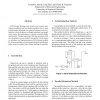Free Online Productivity Tools
i2Speak
i2Symbol
i2OCR
iTex2Img
iWeb2Print
iWeb2Shot
i2Type
iPdf2Split
iPdf2Merge
i2Bopomofo
i2Arabic
i2Style
i2Image
i2PDF
iLatex2Rtf
Sci2ools
107
click to vote
FCCM
2005
IEEE
2005
IEEE
High-Performance FPGA-Based General Reduction Methods
FPGA-based floating-point kernels must exploit algorithmic parallelism and use deeply pipelined cores to gain a performance advantage over general-purpose processors. Inability to hide the latency of lengthy pipelines can significantly reduce the performance or impose unrealistic buffer requirements. Designs requiring reduction operations such as accumulation are particularly susceptible. In this paper we introduce two high-performance FPGA-based methods for reducing multiple sets of sequentially delivered floatingpoint values in optimal time without stalling the pipeline.
Designs Requiring Reduction | FCCM 2005 | FPGA-based floating-point Kernels | Hardware | Unrealistic Buffer Requirements |
Related Content
| Added | 24 Jun 2010 |
| Updated | 24 Jun 2010 |
| Type | Conference |
| Year | 2005 |
| Where | FCCM |
| Authors | Gerald R. Morris, Ling Zhuo, Viktor K. Prasanna |
Comments (0)

